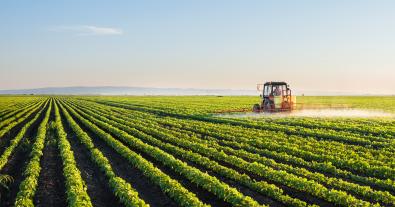THIS INTERNATIONAL ON DEMAND SUMMIT IS AN INDUSTRY… More
Canada, mechanisation for a changing agriculture
According to a study on the Canadian agri-business sector carried out by ICE Toronto on behalf of FederUnacoma, Canada's agricultural geography is projected to experience a period of transformation in the coming years, facilitated by climate change.
Mondo Macchina magazine, FederUnacoma publishes that the mitigation of the harsh Canadian climate, due to rising temperatures, is expected to increase the size of the cultivable area and encourage greater crop diversification. The agro-mechanical sector, which today has 600 thousand tractors and 120,000 combine harvesters, is called upon to meet the new production needs
Climate warming: opportunities and challenges
global warming is creating the conditions for a reconfiguration of the agricultural system. According to the ICE Agency's report, the increase in temperatures, in addition to gaining arable land (taken from the grasp of ice), should lead to a prolongation of the vegetative period of some plants and increase the yield of the related crops.
Mechanization, the primacy of imports
Overall, the Canadian agricultural machinery sector € 45 billion. The domestic demand for agricultural machinery is mainly met through the import channel, especially with regard to the supply of tractors, combine harvesters and diesel engines.
The main suppliers are the US, Germany and Japan (75% of total imports in the sector), followed by China and especially Italy, which over the years has seen an increase in the value of trade with the North American country.
According to ISTAT data reprocessed by FederUnacoma, between 2016 and 2021 Italian exports of agricultural technology rose from just over 61 to about 77 million euros, with a peak of over 82 million in 2020. The increase also continued in the first 10 months of 2022, which saw italian exports of agricultural tractors and equipment exceed 75 million euro (+24.5% from last year).
Canada, the evolution of agricultural mechanisation needs.
the North American country's agriculture is faced with a chronic shortage of specialized labour, which contributes to raising costs and introducing distorting elements into the production system. Investment in agricultural machinery can therefore make up for this shortage by improving and streamlining processes.
The agricultural mechanics sector will therefore be called upon to meet the production needs of an increasingly specialized agriculture, more and more attentive to the optimization of resources and respect for the environment, but less and less labour intensive.
Source: Mondo Macchina/Machinery World, FederUnacoma, Feb 2023.
#MachinesItalia #FederUnacoma #AgriculturalMachinery #ItalianManufacturingExellence #EngineeredwithPassion
Mondo Macchina magazine, FederUnacoma publishes that the mitigation of the harsh Canadian climate, due to rising temperatures, is expected to increase the size of the cultivable area and encourage greater crop diversification. The agro-mechanical sector, which today has 600 thousand tractors and 120,000 combine harvesters, is called upon to meet the new production needs
Climate warming: opportunities and challenges
global warming is creating the conditions for a reconfiguration of the agricultural system. According to the ICE Agency's report, the increase in temperatures, in addition to gaining arable land (taken from the grasp of ice), should lead to a prolongation of the vegetative period of some plants and increase the yield of the related crops.
Mechanization, the primacy of imports
Overall, the Canadian agricultural machinery sector € 45 billion. The domestic demand for agricultural machinery is mainly met through the import channel, especially with regard to the supply of tractors, combine harvesters and diesel engines.
The main suppliers are the US, Germany and Japan (75% of total imports in the sector), followed by China and especially Italy, which over the years has seen an increase in the value of trade with the North American country.
According to ISTAT data reprocessed by FederUnacoma, between 2016 and 2021 Italian exports of agricultural technology rose from just over 61 to about 77 million euros, with a peak of over 82 million in 2020. The increase also continued in the first 10 months of 2022, which saw italian exports of agricultural tractors and equipment exceed 75 million euro (+24.5% from last year).
Canada, the evolution of agricultural mechanisation needs.
the North American country's agriculture is faced with a chronic shortage of specialized labour, which contributes to raising costs and introducing distorting elements into the production system. Investment in agricultural machinery can therefore make up for this shortage by improving and streamlining processes.
The agricultural mechanics sector will therefore be called upon to meet the production needs of an increasingly specialized agriculture, more and more attentive to the optimization of resources and respect for the environment, but less and less labour intensive.
Source: Mondo Macchina/Machinery World, FederUnacoma, Feb 2023.
#MachinesItalia #FederUnacoma #AgriculturalMachinery #ItalianManufacturingExellence #EngineeredwithPassion
Related Articles:

Recent News
POSTED ON

























